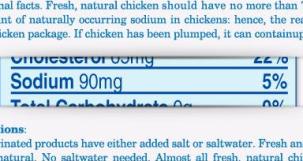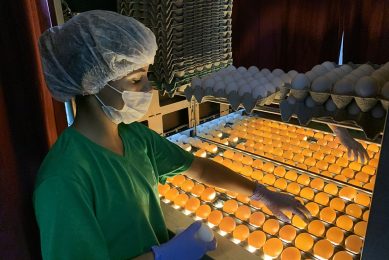Foster Farms launches consumer awareness campaign

Amidst an increasing national focus on sodium as a critical health issue, West Coast poultry producer Foster Farms launches a comprehensive consumer campaign to raise awareness of saltwater-injected or “plumped” chicken.
Plumping
”Plumping”— or the injecting — of fresh, raw chicken with saltwater is a practice employed by many chicken companies which costs consumers money and contributes to serious health issues, says the poultry producer.
nder current USDA labelling laws, brands that plump their poultry may still label their chicken as “100% Natural” or “All-Natural”. According to a new survey, consumers are largely unaware of plumping and would prefer that only non-injected chicken be labeled as “All-Natural”, Foster Farms continues.
Survey findings
“Our survey found that most consumers have no idea that the fresh, raw chicken they purchase intending to season or marinate themselves can contain such high levels of salt,” said Ira Brill, Director of Marketing for Foster Farms. “At a time when consumers are paying attention to their health and their budget, this deserves attention. Many poultry brands contend that injected poultry yields juicier, more flavourful meat, but our survey demonstrates consumers want to know what they’re paying for. Foster Farms’ 100% Natural, fresh chicken line is never plumped.”
Foster Farms has now releases the results of a new survey conducted in March indicating that 63.1% of consumers are largely unaware of the hidden salt in many poultry brands and felt deceived after learning about it.
Among the survey findings:
– Despite the fact that 71.3% of consumers try to watch their sodium intake at least some of the time, many consumers are still unaware of some of the “fine print” in product labels, even for USDA-labeled “100% Natural,” minimally-processed foods like chicken.
– 85.9% of consumers surveyed did not realize that a serving of some brands’ fresh, raw chicken could contain more salt per serving than a large order of french fries.
-74.5% of consumers believe fresh chicken labelled as “natural” should contain no additives or preservatives; 82.4% believe that fresh chicken carrying the “natural” label should not be injected with saltwater.
– Upon learning that the saltwater in injected chicken could cost them nearly $1.50 per package2, 69.2% of consumers felt deceived and 37.2% felt angry.
– After learning about “plumping,” 70.7% will change the way they shop for fresh chicken: 85.4% will read nutrition labels and avoid saltwater-injected chicken, while 71.7% vowed to warn a friend.
“In our 70-year history, Foster Farms has never injected our fresh, raw chicken labeled “100% Natural” with saltwater or any other additives and we will maintain this commitment to consumers. We’ve launched a multifaceted communications campaign to inform consumers about this common practice,” said Brill.
The public info campaign
Foster Farms’ “SAY NO TO PLUMPING” public information campaign includes online and traditional media elements including television advertising featuring the Foster. Unique to this campaign will be the company’s participation in several high-profile events during the summer, where the brand will utilize street teams to spread the word about plumping with entertaining, compelling visuals.
Foster Farms today launches a new online resource where consumers can learn more about plumping and take action. The Foster Farms website features low-sodium recipes, as well as shopping and eating tips from the company’s nutritionist.
Related link:













